Nathia Gali
نتھیا گلی | |
|---|---|
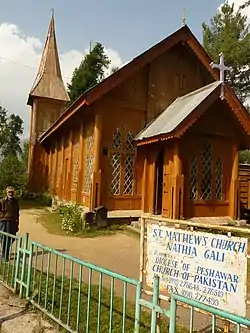 Nathia Gali's St. Matthew's Church, which was built during British colonial rule, photographed in 2014 | |
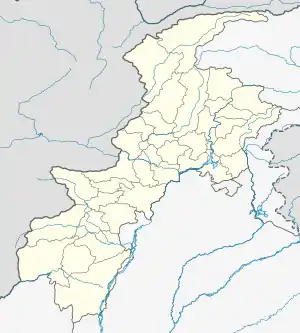 Nathia Gali  Nathia Gali | |
| Coordinates: 34°04′N 73°23′E / 34.067°N 73.383°E | |
| Country | |
| Province | |
| District | Abbottabad District |
| Tehsil | Abbottabad Tehsil |
| Government | |
| • Nazim | Sardar Fayyaz Khan[1] |
| • Naib Nazim | Sardar Zaheed |
| • V.C. Naib Nazim | Wali Ur Rehman Khan |
| Elevation | 2,410 m (7,910 ft) |
| Time zone | UTC+5:00 (Pakistan Standard Time) |
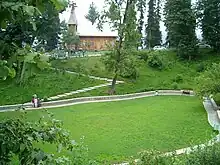
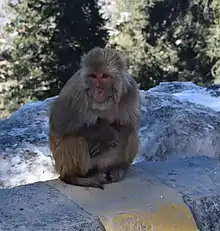



Nathia Gali or Nathiagali (Urdu: نتھیا گلی) is a hill station and mountain resort town located in the Abbottabad District of Khyber Pakhtunkhwa, Pakistan. It is located at the centre of the Galyat range, where several hill stations are situated. Nathia Gali is known for its scenery, hiking trails and weather, which is much cooler than the rest of the Galyat range due to it being at a higher altitude. It is situated approximately 32 kilometres (20 mi) away from both Murree and Abbottabad.[2][3]
History
During British rule, Nathia Gali, then part of Abbottabad tehsil of Hazara District, served as the summer headquarters of the Chief Commissioner of the (then) Peshawar division of the Punjab.[4] The town along with Dunga Gali constituted a notified area under the Punjab Municipalities Act, 1891. The income in 1903-4 was Rs. 3,000 chiefly derived from a house tax, whilst expenditure was Rs. 1,900.
Climate
The weather of Nathia Gali remains cool, pleasant and foggy in summers (1 May to 31 August). During the monsoon season (1 July to 16 September), rain is expected almost every day. Cool winds start to lower temperatures in autumn. Winters (1 November to 28 February) are cold and chilly. In December and January, heavy snowfall may occur. The weather remains cool throughout the spring. In Nathia Gali, the most comfortable weather is during the summer season.[5] Frequent rainfall occurs here annually. Annual rainfall ranges between 1,650 millimetres (65 in) and 1,850 millimetres (73 in). In the winter, temperatures can drop to below −10 °C (14 °F), and in summer it rise to highs over 30 °C (86 °F).
Transportation
The town is connected to Abbottabad and Murree by the Nathia Gali road. Public transport runs daily from Abbottabad and Rawalpindi to Nathia Gali.
Between December and January, heavy snowfall is possible in the area and the road leading to Nathia Gali may occasionally be blocked by heavy snow.
Tourism

Nathia Gali also serves as the administrative centre of the Nathia Gali Union Council. It is located in the Abbottabad District, in Khyber Pakhtunkhwa. At an elevation of 2,410 metres (7,910 ft), it is a popular tourist resort in the summer months. It is forested with pine, cedar, oak, walnut and also other broad-leaved trees.
During the summer, Nathia Gali is relatively popular amongst tourists, but due to its limited area and availability of property, it is not thronged by as many people as the hill-station Murree, which is only an hour away, even though it has more recreation. Nathiagali is known for its trek that leads to Thandiani that passes through Dagri Naka.[6]
Ayubia National Park is also one of the spots here that tourists and nature lovers often visit.
The Nathia Gali Bazaar has a variety of local handicrafts and products available. From traditional shawls, scarves, and embroidered fabrics to intricate woodwork and handmade jewelry, this bazaar is a treasure trove for souvenir hunters.[7]
Scenery

The natural scenery is highly attractive. Nathia Gali is famous for its lush, green meadows and deep forests of oak, cedar and pine. In winter, snowfall adds to the scene. Nathia Gali has a church, St. Matthew's, a remnant from the British period and made entirely of wood. It is situated at the edge of the mountain with a nice panorama towards Kashmir. Nathia Gali has a small bazaar. Mukshpuri and Miranjani are two nearby high peaks. On a clear day, Nanga Parbat can be seen in the distance.
Wildlife
Nathia Gali is home to various species of birds, insects, butterflies and other animals such as rhesus monkeys. The World Wildlife Fund has an office in the Galyat and has assisted in the breeding and reintroduction of the species of the near-extinct common hill leopard in the forests of the Ayubia National Park, right by Dunga Gali and Nathia Gali. This area was thought to be a perfect habitat for them but according to local reports they frequently came out of the forest after cattle of the local villagers and were occasionally shot. Packs of pi-dogs, which were previously considered to be a nighttime menace, can no longer be seen anywhere in the Galyat; it is thought that most have been killed by leopards.
In the summer of 2006, several women were found dead in the deep valleys of Galyat with wounds from attacks. A large leopard was caught and eventually shot. His body has been stuffed and kept in the Dunga Gali Wildlife Museum, where he has been named the 'Ghost of Galyat'. However, despite their reputation, these leopards are rarely spotted.
Subdivisions
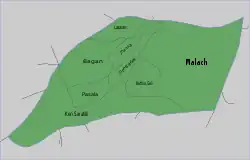
The Union Council of Nathia Gali is divided into the following areas: Bagan, Donga Gali, Jhansa, Keri Sarafali, Keri Raiki, Lassan, Malach, Nathiagali Pasala, and Badhair. Badhair is the central part of the Nathiagali Union Council.[1]
Ethnic groups
The main tribe of Nathia Gali are the Karlal, and a minority of Dhunds (who now call themselves 'Dhund-Abbasis').[8] The locals are a kin to the people of other parts of Galyat and speak Hindko. Until well into the 1960s, most of these tribes and clans were mostly living rather basic and primitive lives, due to lack of educational and employment opportunities.[9] Most of them had to seek jobs and education down in the plains and cities such as Rawalpindi, Lahore, Peshawar and even as far away as Karachi. However, in more recent times, with economic development, many of them are either employed locally in the tourism industry or in various jobs and businesses in the Abbottabad area. It is monitored by GDA.
Gallery
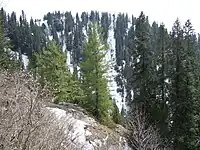


 Pipeline Track, Ayubia National Park
Pipeline Track, Ayubia National Park Mango street vendor at the Main Bazar
Mango street vendor at the Main Bazar
See also
References
- 1 2 Nathia Gali Union Council
- ↑ Nathia Gali - Imperial Gazetteer of India, v. 18, p. 415
- ↑ Nathiagali Archived 2012-08-28 at the Wayback Machine, Publisher: Tourism Development Corporation of Punjab (TDCP). Retrieved 27 October 2012
- ↑ These areas later became part of the then North West Frontier Province from 1901 onwards
- ↑ Nathiagali weather forecast, Publisher: nathiagali.com . Retrieved 10 November 2012.
- ↑ "Attractions". Archived from the original on 2015-01-02. Retrieved 2015-01-02.
- ↑ "Shops & Hotels in Nathia Gali". Stay in Khaira Gali. 2023-09-14. Retrieved 2024-01-09.
- ↑ Hazara Gazetteer 1921; They are akin to the people of Murree area nearby, in Punjab, a continuation of the Galyat range
- ↑ Hazara Divisional Report, 1991-1992, Pub. Govt. of NWFP, 1993, pp. 45-46
External links
- Places to Visit in Abbottabad
- Miranjani Trek by Shaikh Muhammad Ali
- The Pipe Line Trek by Shaikh Muhammad Ali
- Mokshpuri Trek by Shaikh Muhammad Ali
- http://www.nathiagali.com
 Murree travel guide from Wikivoyage
Murree travel guide from Wikivoyage- Nathiagali Pictures
- Governor's House
- Sarhad Tourism Corporation, Government of Khyber Pakhtunkhwa, Pakistan
- http://www.nathiagali.com/?page_id=16
- Hotels in Nathiagali (reservation)
- Hotel in Nathiagali (book your corporate event)
- FAQ about Nathiagali (Question Answers about Nathiagali)